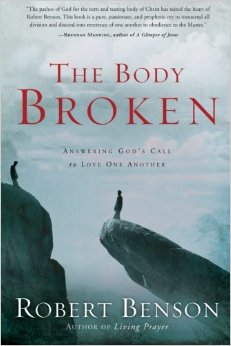
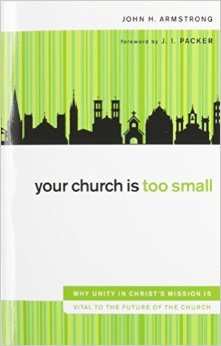 I hope you read my last post reflecting on the diversity of views within the broader church and the need to work for greater unity in Christ, showing grace to those with whom we may disagree. The two main books I reviewed are a bit different in style and tone, but both are beautiful and important.
I hope you read my last post reflecting on the diversity of views within the broader church and the need to work for greater unity in Christ, showing grace to those with whom we may disagree. The two main books I reviewed are a bit different in style and tone, but both are beautiful and important.
Regardless of the degree of your own passion to know and relate well to Christians of other denominational traditions, worship styles, theological methods, cultural leanings, or ethical and political convictions, the fact of the matter is that many churches, or at least most of the ones I know, are themselves nearly ecumenical centers, not quite 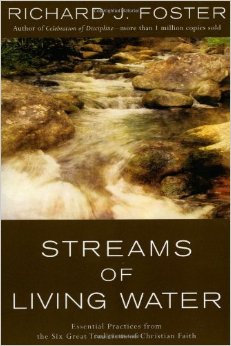 hotbeds of theological diversity, but more varied then most folks admit. To use Richard Foster’s helpful image, some of us have been refreshed by more than one “stream” or type of Christianity.
hotbeds of theological diversity, but more varied then most folks admit. To use Richard Foster’s helpful image, some of us have been refreshed by more than one “stream” or type of Christianity.
I know this isn’t commonly assumed, but think about it. Even conventional, denominational churches have folks who have been informed by non-denominational traditions – – they’ve appreciated some TV preacher, they’ve read one of the ubiquitous evangelical authors, they attend a neighborhood Bible study led by moms from the local community church, their kids were involved in an interdenominational campus ministry like CCO or IVCF or Cru. Those raised in United Methodist homes marry Lutherans and end up Episcopalian. Folks once fired up in a small charismatic Bible study have found a place in a quiet CM&A church; I know a few PCA pastors who are now wearing clericals, serving within the RCA. UCC congregations have former Catholics, and some Orthodox parishes are made up of former independent evangelicals, who were shaped by C.S. Lewis or Dr. Dobson as much as the Desert Fathers or Alexander Schmemann. And, of course, many congregants read, for better or worse, religious news from the mainstream media, take in some Biblical archeology from The History Channel, and come to their own conclusions about this or that as they talk about the pastor’s sermon over Sunday dinner. Church people are not as uniform in their beliefs as we tend to assume, and there are different stages and ages and perspectives on faith within almost any normal church.
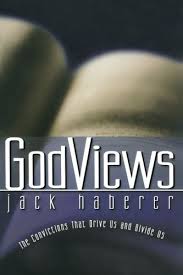 Some tensions within our churches come from what one might say are worldview differences. Jack Haberer years ago studied Presbyterian churches and learned that some members in the same congregation most valued creedal faithfulness, others vibrant worship, others still are glad if their church gives them opportunity for meaningful mission, etc. If you are a relational type and you have dear sisters and brothers, you may not mind a bad sermon. If you are deeply involved in rewarding volunteer work with youth, say, and see vibrant youngsters maturing in faith, you may not care if you like the music in worship or not. That is, what people most want in a church, what they think most counts, emerges from deep assumptions. It may be helpful to explore what we most think of when we think of good faith or a good church to discover why what agitates one person isn’t a big deal to another. That book was called GodViews: The Convictions That Drive Us and Divide Us (WJK; $20.00) and I think there is something to that.
Some tensions within our churches come from what one might say are worldview differences. Jack Haberer years ago studied Presbyterian churches and learned that some members in the same congregation most valued creedal faithfulness, others vibrant worship, others still are glad if their church gives them opportunity for meaningful mission, etc. If you are a relational type and you have dear sisters and brothers, you may not mind a bad sermon. If you are deeply involved in rewarding volunteer work with youth, say, and see vibrant youngsters maturing in faith, you may not care if you like the music in worship or not. That is, what people most want in a church, what they think most counts, emerges from deep assumptions. It may be helpful to explore what we most think of when we think of good faith or a good church to discover why what agitates one person isn’t a big deal to another. That book was called GodViews: The Convictions That Drive Us and Divide Us (WJK; $20.00) and I think there is something to that.
Churches are not as diverse culturally or racially as they ought to be – I’ve shared resources about being more multi-ethnic over and over for years and years, and am grateful that publishers are helping us with insight and ideas — but there is theological diversity in many churches. Evangelical churches have folks sneaking off to read Diana Butler Bass or the late Marcus Borg and more theologically liberal parishes have members who have found renewed faith by reading Tim Keller or Nancy Pearcey. And everybody is reading (the Roman Catholic) Henri Nouwen or watching videos on spiritual formation by John Ortberg or Ruth Haley Barton who draw on monastic wisdom. (This diversity can be destabilizing and troubling or it can be a resource for greater depth and charity, but that is a topic for another day.)
My point is that there are differences that we have to manage and the more we share our faith journeys the more honest we will have to be about this. Further, of course, many churches are still in conflict over worship styles and local ministry plans or budgets, as the ethos of most every congregation is evolving, changing with new leadership and new times and new members.
Even if a congregation’s members mostly share a common faith orientation, they disagree about the details of running the church. It seems there is often room for trouble, conflict to be managed, hurts to be healed. So we need not only graciousness about our theological differences, but reminders of our relational loyalties, learning to deepen our sense of belonging to one another.
The buzz word of our time, it seems to me, is community, and the longings which have put this word on everyone’s lips are profound and will endure. From those of us who remember the shared  friendships lost and lamented in The Big Chill or who came of age watching Thirty-Something or even Parenthood, we long for deep relationships, lasting loyalties, and meaningful friendships. (Do you recall my BookNotes review of the recent Brazos Press book by Wesley Hill called Spiritual Friendship? It is so good!) We want to “do life together.” We read the Bible and realize that Christian faith is communal, deeply relational. American individualism, we increasingly realize, is profoundly flawed and ultimately deadly. The Triune God is relational, and we are wired for community. Wendell Berry is right when he talks about “membership” in the commonwealth. We are in this together.
friendships lost and lamented in The Big Chill or who came of age watching Thirty-Something or even Parenthood, we long for deep relationships, lasting loyalties, and meaningful friendships. (Do you recall my BookNotes review of the recent Brazos Press book by Wesley Hill called Spiritual Friendship? It is so good!) We want to “do life together.” We read the Bible and realize that Christian faith is communal, deeply relational. American individualism, we increasingly realize, is profoundly flawed and ultimately deadly. The Triune God is relational, and we are wired for community. Wendell Berry is right when he talks about “membership” in the commonwealth. We are in this together.
Living with grace and honoring the diversity of personalities, theologies, politics and customs at the local church level may be the crucible for learning the habits of heart and (yes) practices that will help us be more ecumenical in the broader Christian community, too (not to mention more civil in the public square.) Doing local church well, nourishing community and care in what some call “body life” — the life lived out together in the local body of Christ in the ways the New Testament mandates — is urgent not just for the health of the local church, but is a school for relating well at the macro-level.
I would like to think that those who pass the peace with brothers and sisters in worship, embodying practices of reconciliation, week by week, will be nicer people over time, and these folks will play well together at church board meetings and the like. They’ve offered blessings to people, even people they may not like, in this ritual, after all, and we thereby learn to do this stuff, “practicing” in worship what it means to be a peacemaker, out in the world. I would like to think that then those folks who learn to be generous and gracious in the Christian congregation, learning attitudes and skills of community there, will also be the kinds of people who refrain from virtual ugliness on the internet. Yet, I know there are people – me? -who sometimes say things on line that they would never say in person, face-to-face. So the formation of habits that allow us to be in community in the local church, even being skilled peacemakers there, is not a magic bullet or the only way to deepen our ecumenical manners or our public civility. But it helps.
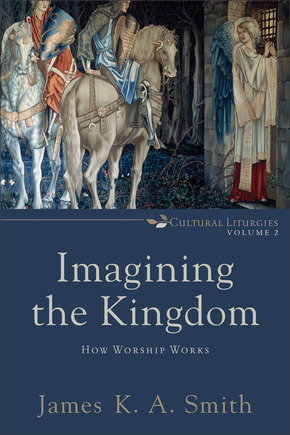
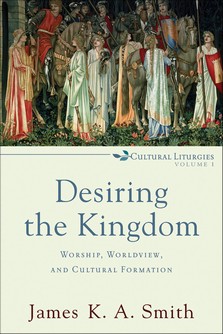 (For deeper explorations of this, by the way, how the rituals of Christian liturgy form us, please see James K.A. Smith’s Desiring the Kingdom: Worship, Worldview, and Cultural Formation and Imagining the Kingdom: How Worship Works (Baker; $22.99 each.) I can’t tell — although I’ve tried in these pages and elsewhere — how very important these serious works are.)
(For deeper explorations of this, by the way, how the rituals of Christian liturgy form us, please see James K.A. Smith’s Desiring the Kingdom: Worship, Worldview, and Cultural Formation and Imagining the Kingdom: How Worship Works (Baker; $22.99 each.) I can’t tell — although I’ve tried in these pages and elsewhere — how very important these serious works are.)
So, yes, yes, talking about community is important. We have a large section of these kinds of resources in the shop (not to mention a whole shelf full of books designed to help small groups leaders nurture better small groups, which is a good step towards more Biblically-shaped, living together in community. Send us a note if you need help with your small group or a small group ministry in your church.) But “community” means much more then having a small group.
Here are 15 books on building community, working for unity in the local church, being the Body.
 Life Together Dietrich Bonhoeffer (HarperOne) $14.99 Bonhoeffer, you may know, wrote his PhD thesis on the nature of the church (perhaps inspired by an epiphany he had about the profound nature of ecclesiology while worshipping once on Palm Sunday in Rome.) His call to radical discipleship and loving service for the sake of the world is deeply interwoven with his views of the forming power of the local Christian church. This is, as the cover rightly proclaims, “The Classic Exploration of Christian Community.” Not many books have endorsing blurbs on the back by Richard Foster, Henri Nouwen, and The New York Times, so I hope you realize this is truly one of the great books of our time. Serious, brief, powerful. It’s a must-read that should be available in your church library and on your shelf.
Life Together Dietrich Bonhoeffer (HarperOne) $14.99 Bonhoeffer, you may know, wrote his PhD thesis on the nature of the church (perhaps inspired by an epiphany he had about the profound nature of ecclesiology while worshipping once on Palm Sunday in Rome.) His call to radical discipleship and loving service for the sake of the world is deeply interwoven with his views of the forming power of the local Christian church. This is, as the cover rightly proclaims, “The Classic Exploration of Christian Community.” Not many books have endorsing blurbs on the back by Richard Foster, Henri Nouwen, and The New York Times, so I hope you realize this is truly one of the great books of our time. Serious, brief, powerful. It’s a must-read that should be available in your church library and on your shelf.
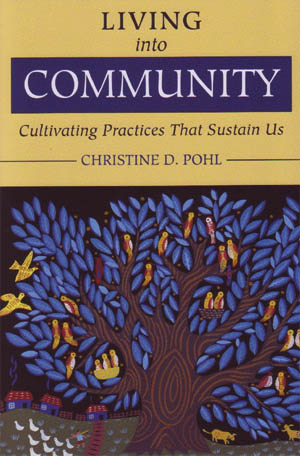 Living into Community: Cultivating Practices That Sustain Us Christian D. Pohl (Eerdmans) $20.00 A thoroughly captivating, fascinating, wise and important book for any educated reader. It is in many ways beautiful, naming and exploring four essential practices that sustain a sense of community, and the obstacles of living into them in these days. This is so good, there is really nothing quite like it in print, making it a must-have, must read book. In a way is a follow up to Pohl’s very important and equally wonderful work on hospitality, Making Room: Recovering Hospitality as a Christian Tradition (Eerdmans; $21.00) Yes!
Living into Community: Cultivating Practices That Sustain Us Christian D. Pohl (Eerdmans) $20.00 A thoroughly captivating, fascinating, wise and important book for any educated reader. It is in many ways beautiful, naming and exploring four essential practices that sustain a sense of community, and the obstacles of living into them in these days. This is so good, there is really nothing quite like it in print, making it a must-have, must read book. In a way is a follow up to Pohl’s very important and equally wonderful work on hospitality, Making Room: Recovering Hospitality as a Christian Tradition (Eerdmans; $21.00) Yes!
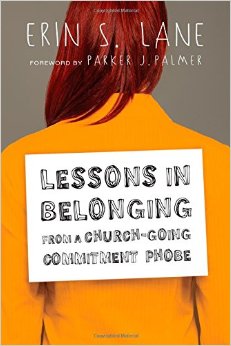 Lessons in Belonging: From a Church-Going Commitment Phobe Erin S. Lane (IVP) $16.00 I have raved about this book before, and think it should be high on the list of books you read about how the local church can be a place of deeper relationships and community. The author is a heck of a great writer — young, a bit snarky, not exactly as colorful as Anne Lamott, say, but equally as funny, she is energetic and wonderfully able to craft very creative, entertaining sentences. Her story — as a hip, young woman, married to a young pastor — follows her own ambivalence about commitment. She calls herself a “commitment phobe” and although that sounds like some generational stereotype, the concerns are real for many of us — introverts and skeptics and those who have been hurt or fear deeper friendships. This is a good, smart book about the ups and downs of belonging, even to a small, normal church, and I recommend it highly. There is a great foreword by her friend and mentor, Quaker writer Parker Palmer. Phyllis Tickle says “One of the clearest and certainly one of the most informing pictures I have seen to date of the generation of young adults who presently are shaping the twenty-first century church.”
Lessons in Belonging: From a Church-Going Commitment Phobe Erin S. Lane (IVP) $16.00 I have raved about this book before, and think it should be high on the list of books you read about how the local church can be a place of deeper relationships and community. The author is a heck of a great writer — young, a bit snarky, not exactly as colorful as Anne Lamott, say, but equally as funny, she is energetic and wonderfully able to craft very creative, entertaining sentences. Her story — as a hip, young woman, married to a young pastor — follows her own ambivalence about commitment. She calls herself a “commitment phobe” and although that sounds like some generational stereotype, the concerns are real for many of us — introverts and skeptics and those who have been hurt or fear deeper friendships. This is a good, smart book about the ups and downs of belonging, even to a small, normal church, and I recommend it highly. There is a great foreword by her friend and mentor, Quaker writer Parker Palmer. Phyllis Tickle says “One of the clearest and certainly one of the most informing pictures I have seen to date of the generation of young adults who presently are shaping the twenty-first century church.”
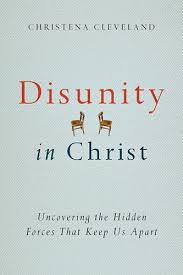 Disunity in Christ:Uncovering the Hidden Forces That Keep Us Apart Christena Cleveland (IVP) $16.00 I’ve given enthusiastic shout-outs about this before, in print, and at events, hoping that many will want to grapple with this great book. It is not the only book about the things that divide us such as race and class and gender, but it is perhaps the best. It is great because Ms Cleveland is Biblically-grounded, clear, and also because she is, interestingly, upbeat and even humorous. Heady, heavy, liberationist hermeneutics about class and gender may appeal to liberal academics, but most of us – whether we are in mainline churches or evangelical fellowships- need encouragement, challenge, inspiration, and useful guidance. Cleveland is an African American sociologist and teacher, and is well suited to help us navigate this provocative stuff, and she does it really well. She tells good stories, offers keen insight, pushes us a bit, and invites God to guide us into deeper unity and mature diversity. I love this author and her good book, and believe it will help us uncover hidden influences, allowing us to move in healthy directions, for God’s glory. Please, read this book! You’re sense of community can only be enhanced by exploring how even our conversational patterns can be off putting, and how learning some cross-cultural awareness can help. Cleveland is now the Director of the exceptional Center for Reconciliation at Duke Divinity School.
Disunity in Christ:Uncovering the Hidden Forces That Keep Us Apart Christena Cleveland (IVP) $16.00 I’ve given enthusiastic shout-outs about this before, in print, and at events, hoping that many will want to grapple with this great book. It is not the only book about the things that divide us such as race and class and gender, but it is perhaps the best. It is great because Ms Cleveland is Biblically-grounded, clear, and also because she is, interestingly, upbeat and even humorous. Heady, heavy, liberationist hermeneutics about class and gender may appeal to liberal academics, but most of us – whether we are in mainline churches or evangelical fellowships- need encouragement, challenge, inspiration, and useful guidance. Cleveland is an African American sociologist and teacher, and is well suited to help us navigate this provocative stuff, and she does it really well. She tells good stories, offers keen insight, pushes us a bit, and invites God to guide us into deeper unity and mature diversity. I love this author and her good book, and believe it will help us uncover hidden influences, allowing us to move in healthy directions, for God’s glory. Please, read this book! You’re sense of community can only be enhanced by exploring how even our conversational patterns can be off putting, and how learning some cross-cultural awareness can help. Cleveland is now the Director of the exceptional Center for Reconciliation at Duke Divinity School.
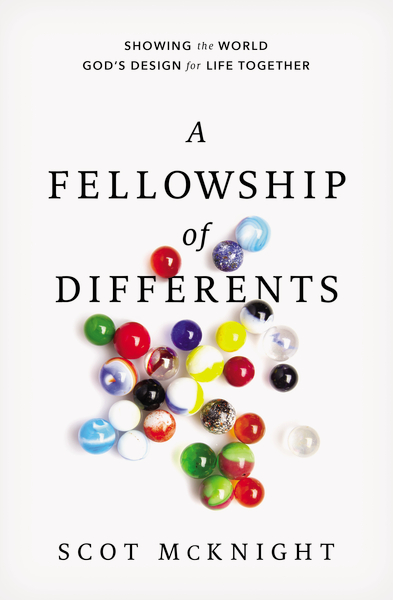 A Fellowship of Differents: Showing the World God’s Design for Life Together Scot McKnight (Zondervan) $19.99 Dr. McKnight is a major, evangelical, Bible scholar, one who has written detailed commentaries and academic work, as well has helpful books for on everything from fasting to praying the hours to the ethics of following Jesus to interpreting the Bible. We regularly promote his One.Life and (mostly positively) reviewed his important The Kingdom Conspiracy. Here he is doing what he sometimes does – offers mature and informed scholarship in chatty, upbeat, funny and sensible ways, making it informative and inspiring. I like McKnight a lot and really appreciate his insistence in this book that our local congregations should be more diverse, less homogeneous, more gracious, a place where we learn to live together, witnessing to the world about the peace that passes understanding. The title is a great one, eh? In a few chapters, McKnight gets at this as well as any other book, and speaks bold truth, even hard truth, in ways that seem natural and do-able. Thanks be to God for this good brother and his generous vision of a diverse church and his explaining how the glories of the reign of God must be known and shown in the local church, where people flourish and grace is experienced and diversity is event, even as a deeper unity is celebrated and broken relationships are healed. Yet, I must say, a few of these chapters – as good as they are – drift off into what I might call “basic Christian growth” offering (very) good insight for daily discipleship but seeming to be not terribly connected to the basic point of the book. I am not sure I agree with the blurb on the back by Derwin Gray (“This is the most important book you may ever read outside of the Bible”) but it does indicate that it is exceptionally useful. Christena Cleveland says “Anyone who desires unity with all of God’s people, not just the ones who are most like us, will be emboldened by this book.” Let’s hope!
A Fellowship of Differents: Showing the World God’s Design for Life Together Scot McKnight (Zondervan) $19.99 Dr. McKnight is a major, evangelical, Bible scholar, one who has written detailed commentaries and academic work, as well has helpful books for on everything from fasting to praying the hours to the ethics of following Jesus to interpreting the Bible. We regularly promote his One.Life and (mostly positively) reviewed his important The Kingdom Conspiracy. Here he is doing what he sometimes does – offers mature and informed scholarship in chatty, upbeat, funny and sensible ways, making it informative and inspiring. I like McKnight a lot and really appreciate his insistence in this book that our local congregations should be more diverse, less homogeneous, more gracious, a place where we learn to live together, witnessing to the world about the peace that passes understanding. The title is a great one, eh? In a few chapters, McKnight gets at this as well as any other book, and speaks bold truth, even hard truth, in ways that seem natural and do-able. Thanks be to God for this good brother and his generous vision of a diverse church and his explaining how the glories of the reign of God must be known and shown in the local church, where people flourish and grace is experienced and diversity is event, even as a deeper unity is celebrated and broken relationships are healed. Yet, I must say, a few of these chapters – as good as they are – drift off into what I might call “basic Christian growth” offering (very) good insight for daily discipleship but seeming to be not terribly connected to the basic point of the book. I am not sure I agree with the blurb on the back by Derwin Gray (“This is the most important book you may ever read outside of the Bible”) but it does indicate that it is exceptionally useful. Christena Cleveland says “Anyone who desires unity with all of God’s people, not just the ones who are most like us, will be emboldened by this book.” Let’s hope!
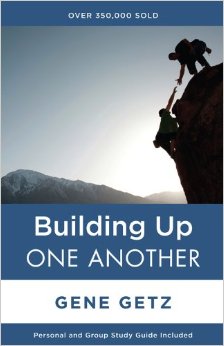 Building Up One Another Gene Getz (David C. Cook) $12.99 This little volume is a powerhouse of a paperback, a simple bit of Bible teaching by a fine evangelical leader (now consulting as the president of Center for Church Renewal.) This is a tremendous idea, each chapter a study of one of the many “one another” commands in the New Testament. He unpacks the meaning and offers simple suggestions for building up one another, serving one another, bearing with one another, even teaching on the seemingly mundane mandates like greeting one another. The study guide that is included is helpful, with some self-assessment questions, too. This will help us get beyond merely tolerating one another, but living into the truth of our being “members of one another.” Very practical, no-nonsense, practical.
Building Up One Another Gene Getz (David C. Cook) $12.99 This little volume is a powerhouse of a paperback, a simple bit of Bible teaching by a fine evangelical leader (now consulting as the president of Center for Church Renewal.) This is a tremendous idea, each chapter a study of one of the many “one another” commands in the New Testament. He unpacks the meaning and offers simple suggestions for building up one another, serving one another, bearing with one another, even teaching on the seemingly mundane mandates like greeting one another. The study guide that is included is helpful, with some self-assessment questions, too. This will help us get beyond merely tolerating one another, but living into the truth of our being “members of one another.” Very practical, no-nonsense, practical.
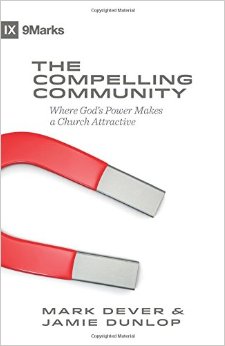 The Compelling Community: Where God’s Power Makes a Church Attractive Mark Dever & Jamie Dunlop (Crossway) $15.99 This new book is a very solid, conservatively evangelical study of how the gospel itself is what transforms a church. It contrasts the often frenzied efforts to “create” community and resists any pre-packaged plan or manipulation to develop deeper relationships with their sense that the preaching of the gospel, and a church being shaped by the historic marks of the church, will, with proper vision casting and gospel-centered teaching, become a body of those who truly love one another and reach out with hospitality and care to others. Dever and Dunlop are leaders at the thriving Capitol Hill Baptist and their church is nicely well known for their tight-knit community. They provide “an alternative to running your church on the building blocks of specialization and segmentation.” Designed mostly for church leaders — there are excellent pieces about structural matters in the congregations ethos or schedule that mitigate against the teaching of each chapter — this is a seriously Biblical call to authentic Christian community in the well-ordered, grace-based local congregation.
The Compelling Community: Where God’s Power Makes a Church Attractive Mark Dever & Jamie Dunlop (Crossway) $15.99 This new book is a very solid, conservatively evangelical study of how the gospel itself is what transforms a church. It contrasts the often frenzied efforts to “create” community and resists any pre-packaged plan or manipulation to develop deeper relationships with their sense that the preaching of the gospel, and a church being shaped by the historic marks of the church, will, with proper vision casting and gospel-centered teaching, become a body of those who truly love one another and reach out with hospitality and care to others. Dever and Dunlop are leaders at the thriving Capitol Hill Baptist and their church is nicely well known for their tight-knit community. They provide “an alternative to running your church on the building blocks of specialization and segmentation.” Designed mostly for church leaders — there are excellent pieces about structural matters in the congregations ethos or schedule that mitigate against the teaching of each chapter — this is a seriously Biblical call to authentic Christian community in the well-ordered, grace-based local congregation.
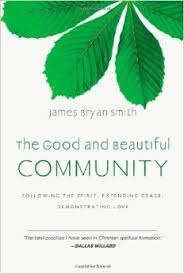 The Good and Beautiful Community: Following the Spirit, Extending Grace, Demonstrating Love James Bryan Smith (IVP) $23.00 Oh, how I hope you know this trilogy of books – the Apprentice Series. Dallas Willard says of them that they are “The best practice I have seen in Christian spiritual formation.” The first was The Good and Beautiful God followed by The Good and Beautiful Life. This third one, with good Bible study, helpful and inspiring insights, and practical “Soul Training” exercises, is all about the local church, the community in which we find ourselves, those to whom we belong and are bound together for spiritual formation and whole-life discipleship. Can we live out Galatians 5:6 – faith expressing itself through love? Can we create local faith communities that could honestly be called “good and beautiful”? One doesn’t have to read these books in order (although it may help.) Lovely, good, true.
The Good and Beautiful Community: Following the Spirit, Extending Grace, Demonstrating Love James Bryan Smith (IVP) $23.00 Oh, how I hope you know this trilogy of books – the Apprentice Series. Dallas Willard says of them that they are “The best practice I have seen in Christian spiritual formation.” The first was The Good and Beautiful God followed by The Good and Beautiful Life. This third one, with good Bible study, helpful and inspiring insights, and practical “Soul Training” exercises, is all about the local church, the community in which we find ourselves, those to whom we belong and are bound together for spiritual formation and whole-life discipleship. Can we live out Galatians 5:6 – faith expressing itself through love? Can we create local faith communities that could honestly be called “good and beautiful”? One doesn’t have to read these books in order (although it may help.) Lovely, good, true.
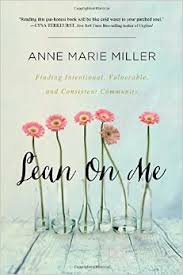 Lean on Me: Finding Intentional, Vulnerable, and Consistent Community Anne Marie Miller (Thomas Nelson) $15.99 I hope you know Miller, who wrote a the profoundly moving Permission to Speak Freely which is also about being vulnerable, real, gut-wrenchingly accepting within the local church. Here she tells her own story – itself worth reading – and draws helpful principles for renewal, committed, healing relationships. Upbeat, conversational, very interesting for those who appreciate such an honest, passionate voice. This is a great read and would make a nice choice for a book club.
Lean on Me: Finding Intentional, Vulnerable, and Consistent Community Anne Marie Miller (Thomas Nelson) $15.99 I hope you know Miller, who wrote a the profoundly moving Permission to Speak Freely which is also about being vulnerable, real, gut-wrenchingly accepting within the local church. Here she tells her own story – itself worth reading – and draws helpful principles for renewal, committed, healing relationships. Upbeat, conversational, very interesting for those who appreciate such an honest, passionate voice. This is a great read and would make a nice choice for a book club.
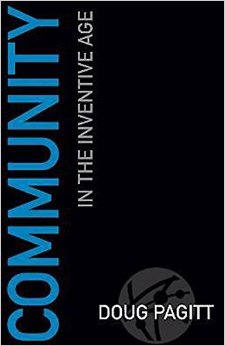 Community in the Inventive Age Doug Pagitt (Abingdon) $16.99 I love the way this book does some clear-headed, basic, cultural assessment – showing how things have shifted from the Agrarian Age, the Industrial Age, the Information Age and what kinds of churches tended to emerge in those social settings – helping us understand some of the contours of our own “inventive” era. He may or may not be fully right about this age of transition and how that means we must rethink leadership patterns and faith formation within the local congregation, but I assure you it is interesting and important material. Some serious sociologists might take exception to his quickly summarized categories and some serious theologians will think he’s a bit light-weight on stuff that matters most, but for a quick read to stir the pot, it is a very, very helpful manifesto. If you like Len Sweet’s early work, Phyllis Tickle’s cultural analysis, if you’ve followed the Emergent conversations, you will appreciate this insight gleaned from Pagitt’s own Solomon’s Porch, a wholistic missional community in Minneapolis. See also his Evangelism in the Inventive Age and Preaching in the Inventive Age. Very candid and creative about new ways to do church, based less on “bounded sets” but relationships.
Community in the Inventive Age Doug Pagitt (Abingdon) $16.99 I love the way this book does some clear-headed, basic, cultural assessment – showing how things have shifted from the Agrarian Age, the Industrial Age, the Information Age and what kinds of churches tended to emerge in those social settings – helping us understand some of the contours of our own “inventive” era. He may or may not be fully right about this age of transition and how that means we must rethink leadership patterns and faith formation within the local congregation, but I assure you it is interesting and important material. Some serious sociologists might take exception to his quickly summarized categories and some serious theologians will think he’s a bit light-weight on stuff that matters most, but for a quick read to stir the pot, it is a very, very helpful manifesto. If you like Len Sweet’s early work, Phyllis Tickle’s cultural analysis, if you’ve followed the Emergent conversations, you will appreciate this insight gleaned from Pagitt’s own Solomon’s Porch, a wholistic missional community in Minneapolis. See also his Evangelism in the Inventive Age and Preaching in the Inventive Age. Very candid and creative about new ways to do church, based less on “bounded sets” but relationships.
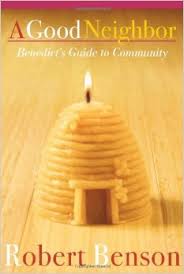 A Good Neighbor: Benedict’s Guide to Community Robert Benson (Paraclete) $14.99 I raved about Robert Benson as a writer and inspired, down-to-Earth spiritual guide in the last BookNotes post, telling about his poignant book lamenting our denominational disunity, The Body Broken. Here, he offers a too brief, splendidly written, truly lovely meditation on meaningful connections — in your small group, in your neighborhood, amongst your friends, and of course in your own local congregation, drawing on the ancient Rule of St Benedict of Nursia. Most of us, he explains, are involved with many people, mostly all day long, but still feel disconnected, even lonely. As it says on the back A Good Neighbor “takes an intimate look at how others are defining, discovering, nurturing, and sustaining life and love right where you are. Facing the confusing contradictions of modern life head on, Benson shows what it means to live in our neighborhoods, work at our jobs, be family, and be friends, in ways that builds places of relationships, love, and mutual support.” I adore this gentle guide to Benedictine views of promises and belonging and service to and with one another; what is interesting, and what sets this book apart somewhat from most others on this list, is that, in Benson’s hands, this monastic vision drawn from the Rule is applied to ordinary life for ordinary folk, less about forming “a” community (at church, in a small group, in an intentional community household) but more about being open to deep friendships and a sense of belonging to one another in various spheres of life and in various locations. He talks about how people are “given” to us — those who routinely cross our paths or are in some sort of relationship, gently giving a holy obligation to see each as a gift. What a lovely, lovely, book!
A Good Neighbor: Benedict’s Guide to Community Robert Benson (Paraclete) $14.99 I raved about Robert Benson as a writer and inspired, down-to-Earth spiritual guide in the last BookNotes post, telling about his poignant book lamenting our denominational disunity, The Body Broken. Here, he offers a too brief, splendidly written, truly lovely meditation on meaningful connections — in your small group, in your neighborhood, amongst your friends, and of course in your own local congregation, drawing on the ancient Rule of St Benedict of Nursia. Most of us, he explains, are involved with many people, mostly all day long, but still feel disconnected, even lonely. As it says on the back A Good Neighbor “takes an intimate look at how others are defining, discovering, nurturing, and sustaining life and love right where you are. Facing the confusing contradictions of modern life head on, Benson shows what it means to live in our neighborhoods, work at our jobs, be family, and be friends, in ways that builds places of relationships, love, and mutual support.” I adore this gentle guide to Benedictine views of promises and belonging and service to and with one another; what is interesting, and what sets this book apart somewhat from most others on this list, is that, in Benson’s hands, this monastic vision drawn from the Rule is applied to ordinary life for ordinary folk, less about forming “a” community (at church, in a small group, in an intentional community household) but more about being open to deep friendships and a sense of belonging to one another in various spheres of life and in various locations. He talks about how people are “given” to us — those who routinely cross our paths or are in some sort of relationship, gently giving a holy obligation to see each as a gift. What a lovely, lovely, book!
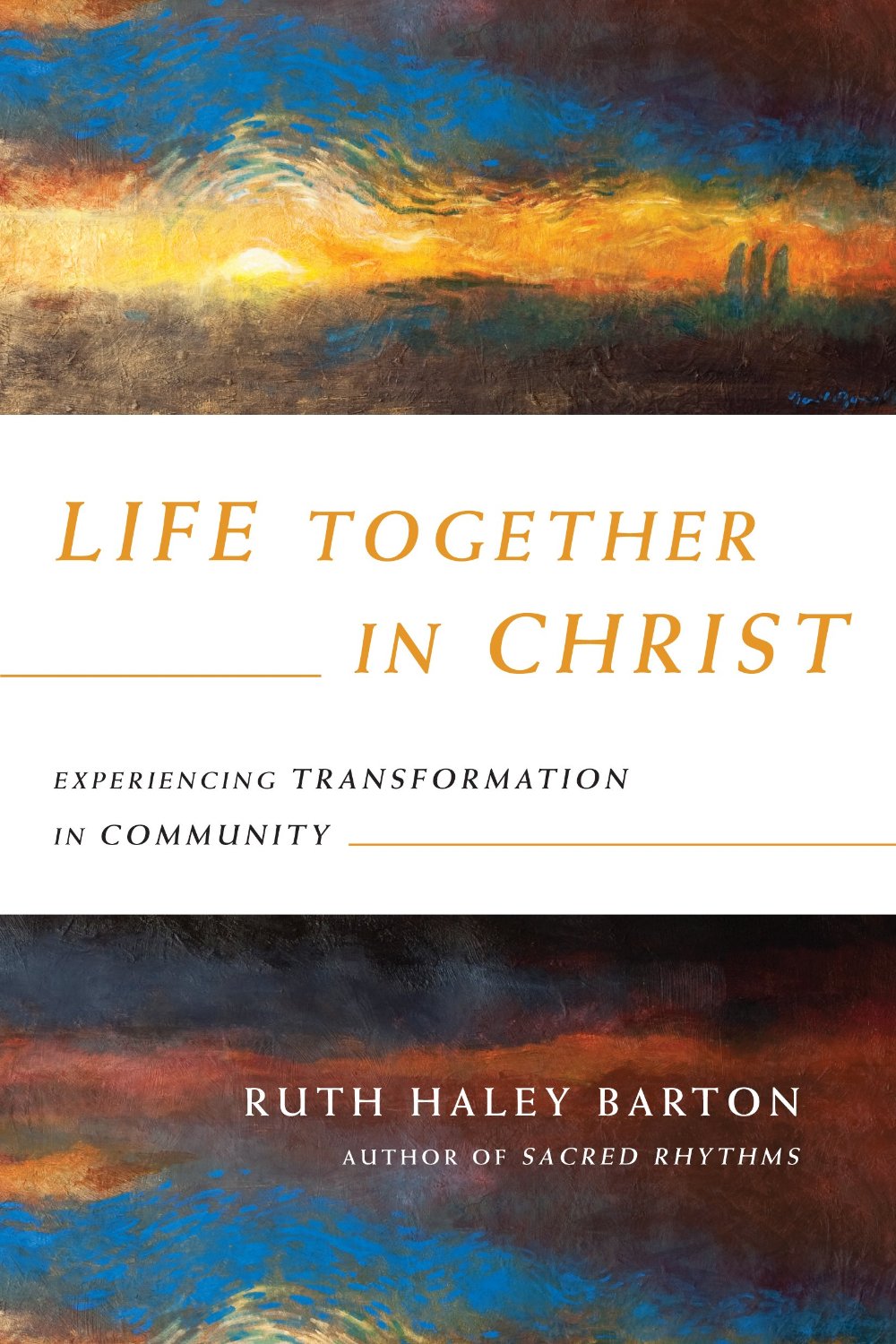 Life Together in Christ: Experiencing Transformation in Community Ruth Haley Barton (IVP) $18.00 While this book is initially, mostly, about spiritual formation – learning to practice the classic disciplines, creating “sacred rhythms” in order to experience God’s gentle transformation as we encounter the centering Spirit – it insists that this happens best when we are in community. In many ways, Ruth has been one of our best guides into the inner life, in her great books In Search of Silence and Solitude and Sacred Rhythms and Deepening the Soul of Your Leadership. However, here she brings these insights and invitations to a transformed life into the context of an intimate community, offering guidance for small groups who want to do this inner work together. My, my, this is sweet, challenging, vital material, fabulous for any small group wanting to experience God, opening themselves to spiritual transformation together.
Life Together in Christ: Experiencing Transformation in Community Ruth Haley Barton (IVP) $18.00 While this book is initially, mostly, about spiritual formation – learning to practice the classic disciplines, creating “sacred rhythms” in order to experience God’s gentle transformation as we encounter the centering Spirit – it insists that this happens best when we are in community. In many ways, Ruth has been one of our best guides into the inner life, in her great books In Search of Silence and Solitude and Sacred Rhythms and Deepening the Soul of Your Leadership. However, here she brings these insights and invitations to a transformed life into the context of an intimate community, offering guidance for small groups who want to do this inner work together. My, my, this is sweet, challenging, vital material, fabulous for any small group wanting to experience God, opening themselves to spiritual transformation together.
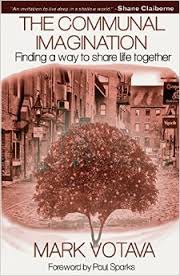 The Communal Imagination: Finding a Way to Share Life Together Mark Votava (Urban Loft Publishers) $12.99 The author is part of a missional faith community in Tacoma Washington, living in incarnational ways that allow for a deep sense of place to emerge, and in this splendid, thorough work shows how the local church body can help us slow down, learn from our local region, and resist the hyper-mobile, individualistic culture, creating, instead, places where people can know and be known, love and be loved. Missional theologian Michael Frost says “Mark Votava’s book is like a smooth stone in a churning stream…it is a sure and unwavering call to simplicity, presence, attentiveness, and collaboration. Read it slowly. It calls us to nothing less then a new way of being human.” A visionary, important book from a small, indie press.
The Communal Imagination: Finding a Way to Share Life Together Mark Votava (Urban Loft Publishers) $12.99 The author is part of a missional faith community in Tacoma Washington, living in incarnational ways that allow for a deep sense of place to emerge, and in this splendid, thorough work shows how the local church body can help us slow down, learn from our local region, and resist the hyper-mobile, individualistic culture, creating, instead, places where people can know and be known, love and be loved. Missional theologian Michael Frost says “Mark Votava’s book is like a smooth stone in a churning stream…it is a sure and unwavering call to simplicity, presence, attentiveness, and collaboration. Read it slowly. It calls us to nothing less then a new way of being human.” A visionary, important book from a small, indie press.
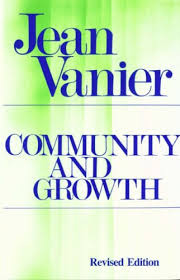 Community and Growth Jean Vanier (Paulist Press) $22.95 I do not know if most ordinary church folks will want to wade through this thick and important work, but you should know it, and realize it is perhaps the best thing written in our time about deepening serious, intentional community. You may know Jean Vanier as the gentle, French Canadian who started the L’Arche communities (that so attracted Henri Nouwen in the last years of his life) which forms community with persons with disabilities. Here, he draws on ancient monastic wisdom, psychological and spiritual insights, and invites us to give ourselves to one another in service and care. Anyone living in any sort of intentional community household must know this, and anyone longing for the deepest sort of communal experience will benefit. This is a masterpiece.
Community and Growth Jean Vanier (Paulist Press) $22.95 I do not know if most ordinary church folks will want to wade through this thick and important work, but you should know it, and realize it is perhaps the best thing written in our time about deepening serious, intentional community. You may know Jean Vanier as the gentle, French Canadian who started the L’Arche communities (that so attracted Henri Nouwen in the last years of his life) which forms community with persons with disabilities. Here, he draws on ancient monastic wisdom, psychological and spiritual insights, and invites us to give ourselves to one another in service and care. Anyone living in any sort of intentional community household must know this, and anyone longing for the deepest sort of communal experience will benefit. This is a masterpiece.
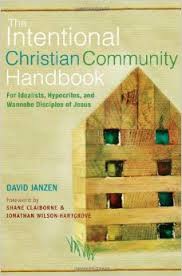 The Intentional Christian Community Handbook: For Idealists, Hypocrites, and Wannabe Disciples of Jesus David Janzen (Paraclete) $19.99 This is another book that simply has to be on this list — it is really the only and very best book of its kind — event though it has, admittedly, a pretty small market. This is a wonderful guidebook for those who want to live together in intentional community, doing house-holding together, maybe drawing on new monastic insights, forming relationships shaped by common rules and practices. The foreword is by Shane Claiborne and Jonathan Wilson-Hartgrove, which will give you a hint of its vision. Janzen (who graduated from Bethel College and studied at Harvard Divinity School) has been part of significant intentional communities such as New Creation Fellowship and Reba Place Fellowship. Whether you are interested in “living together in a world falling apart” or have any sort of housing ministry — maybe a discipleship house, a Fellows community, a camping staff that live together, or a house or cell church — this is going to be really useful. There are tons of good stories, interviews, wise guidance and substantive input about being in intentional community and deeper levels of body life.
The Intentional Christian Community Handbook: For Idealists, Hypocrites, and Wannabe Disciples of Jesus David Janzen (Paraclete) $19.99 This is another book that simply has to be on this list — it is really the only and very best book of its kind — event though it has, admittedly, a pretty small market. This is a wonderful guidebook for those who want to live together in intentional community, doing house-holding together, maybe drawing on new monastic insights, forming relationships shaped by common rules and practices. The foreword is by Shane Claiborne and Jonathan Wilson-Hartgrove, which will give you a hint of its vision. Janzen (who graduated from Bethel College and studied at Harvard Divinity School) has been part of significant intentional communities such as New Creation Fellowship and Reba Place Fellowship. Whether you are interested in “living together in a world falling apart” or have any sort of housing ministry — maybe a discipleship house, a Fellows community, a camping staff that live together, or a house or cell church — this is going to be really useful. There are tons of good stories, interviews, wise guidance and substantive input about being in intentional community and deeper levels of body life.
BookNotes
DISCOUNT
ANY ITEM MENTIONED
20% off
order here
takes you to the secure Hearts & Minds order form page
just tell us what you want
inquire here
if you have questions or need more information
just ask us what you want to know
Hearts & Minds 234 East Main Street Dallastown, PA 17313 717-246-3333
